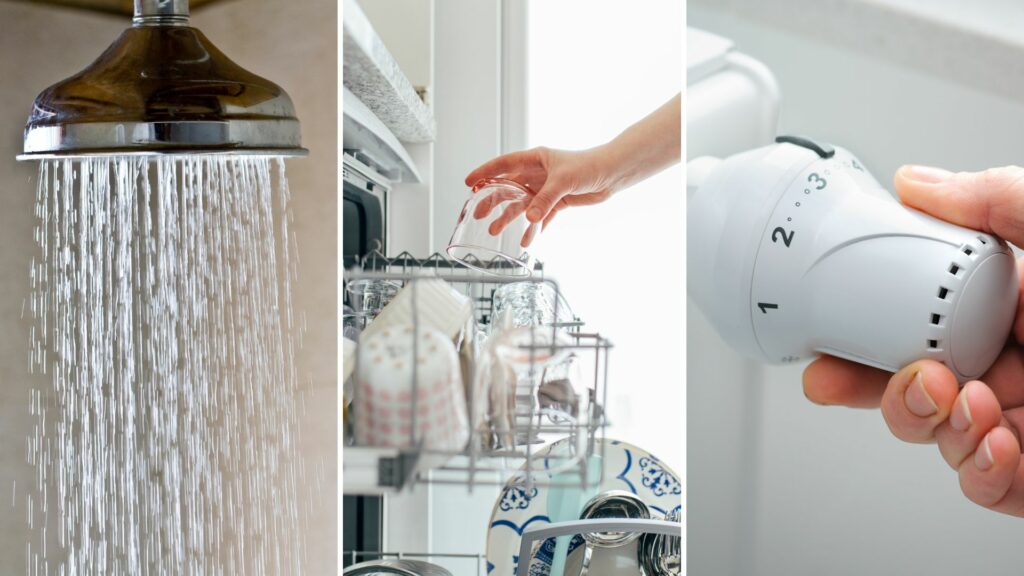Fridges, electrical appliances, lamps... Small changes can help reduce consumption and, ultimately, energy bills. Here are eight things you can do to help lower your energy bills.
As the temperatures continue to drop and the energy prices remain high, every little bit counts to keep your energy bills as low as possible.
Defrost often
Along with the refrigerator, the freezer is one of the domestic appliances that works almost continuously. A freezer can consume more than 300 kWh per year – or 10% to 15% of our electricity consumption. All the more reason to defrost it regularly.
Two millimetres of frost in the freezer results in a 10% increase in consumption. Five millimetres is 30% more consumption. Defrosting regularly saves 22 kWh per year. That's a little more than €17.
Hot water in moderation
Domestic hot water accounts for 10% to 20% of the energy bill; a bath is 100 to 120 litres of water, a five-minute shower with a conventional shower head consumes about 30 to 40 litres. Best of all, an economical showerhead that limits water outflow while optimising jet pressure consumes about half as much water as a regular showerhead. The energy bill is reduced accordingly.
An economical hand shower can even save up to 75% of water. Install a timer in the shower that will allow you to limit the time you spent under running water to five minutes. Set the temperature of the water heater to 55ºC. Compared to a temperature of 70ºC, this saves 25% of energy.
Cover your pans
Cover the pan when you cook. This divides the cooking time by three and consumes 25% less energy. As soon as the liquids boil, reduce the heat by two-thirds. At the end of cooking, you can turn off the hob a little early to let the food finish cooking.
If you have a forced-air oven, preheat with this feature. And by turning off the oven before cooking is complete, you can save 10% on electricity.
Fill the dishwasher well
A dishwasher is greedy for electricity and water: each wash cycle consumes about ten litres of water and 1 kWh of electricity. If it needs to be operated, make sure to fill it up properly. A reduction of four cycles per month will give you a saving of about €10 per year.
Use the dishwasher's Eco mode (not to be confused with quick mode). Eco mode is longer, but it uses less electricity. That's 45% energy saved compared to intensive mode.
Don't overload the fridge
Like the freezer, the refrigerator is a particularly greedy device: it is about 10% to 15% of our electricity consumption (about 300 kWh/year, €180). Hence the importance of choosing a low-energy model.
Avoid overloading it: do not overload it with food that you won't consume for a while, close the door quickly after opening it, do not position it next to a heat source, keep the temperature in the fridge between 5ºC and 7ºC, no less. Let food cool before placing it in the refrigerator. You have a dish to thaw? Choose the fridge, not the oven. In case of urgency, use the microwave.
Choose your oven wisely
If you change your stove, opt for induction. It is the most economical electric version. According to the Dutch organization Milieucentraal, an average gas stove consumes 381 kWh/year (€67), the equivalent of induction 175 kWh (€31).
Lower the temperature of the washing machine
In an average household, the washing machine runs about 200 times a year. This consumption can be reduced by making sure to fill the drum well before starting the machine. This could save 15% of electricity.
Washing clothes at 40ºC also consumes half as much energy as washing at 90ºC. Washing at 30ºC consumes three times less energy. Washing at 30ºC rather than 60ºC saves about €27 per year.
The Eco program consumes almost 50% less energy and half as much water as the normal program. Using it systematically saves about €7 per year. Forget the dryer, it's about 200 kWh per year. To do without it is nearly €120 saved. Air dry your laundry.
Lower the thermostat (a little)
Heating accounts for 65% to 75% of energy consumption in an average home. Heat only the rooms where you are, changing the temperature according to the place. In the living room, 18-20ºC is enough. Lowering the thermostat by one degree saves about 5% to 7% on your bill. Based on an average heating system, this can reach €670 in savings.
Reducing the heating (to 15ºC) at night results in a saving of 10% to 25% of energy. If you have shutters, close them overnight. This reduces heat loss through windows by up to 60%.

